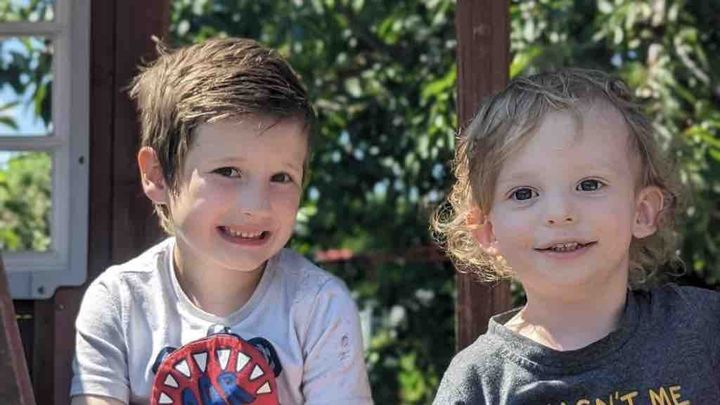
The Tucker’s Fight Against Batten Disease
Donation protected
It started with delayed speech, which was believed to be Verbal Apraxia. Alright, we can deal with that. The little guy is gonna have a harder time communicating than others, but that’s ok. He’s so smart and always has a way of knowing what a person needs to understand him, whether it be words with gestures, or maybe pointing to things - no problem, we got this.
Then we began noticing the eye rolls, I’m not completely sure when exactly this started, as we thought he was being silly and rolling his eyes at us. Shortly before starting kindergarten, his parents took him to the doctor to have it checked out… just in case, fully assuming it would be nothing.
Our sweet, loving grandson Michael was 5 years old when he was taken to the neurologist for his first EEG and it wasn't nothing, it was absence seizures–a brief sudden loss of consciousness.
The doctors began treating him with epilepsy medication. After about six months, when the medication wasn’t working, they gave him stronger medication. It didn’t help either, in fact the seizures seemed to worsen. At this time, they did a 24-hour EEG to see how many seizures Michael was having. It only took six hours to determine that he was having hundreds of absence seizures a day. His doctors grew quite concerned and thought it best to do some genetic testing.
Many tests were ordered and our happy, trusting little boy was poked and prodded for months, until his genetic tests results revealed a mutation in his TPP1 gene, indicating the possibility he had CLN2 Batten Disease. Batten Disease is a rare neurodegenerative genetic disorder with no known cure, and a life expectancy of late teens to early 20s. Those years are filled with seizures, dementia, loss of sight, mobility and speech.
Tests were immediately ordered for the rest of the family, including Michael’s four-year-old sister and 20-month-old brother. Talia’s results were good. Baby Oliver’s however, were not.
Though this news devastated us to the core, we refuse to give up hope. We are exploring every possible treatment option to make our young and vulnerable boys’ lives as full as we can, for as long as we can.
Currently, there is only one FDA-approved treatment that involves receiving infusions of an enzyme replacement therapy called cerliponase alfa (Brineura®) every two weeks. Providers inject the medicine directly into the fluid surrounding the child’s brain. It can slow or even stop the loss of the ability to walk and talk. However, it does not slow down other symptoms of the disorder.
This procedure is done at Seattle’s Children's Hospital, a remarkable hospital on the other side of the state from where the boys and their entire support system live. If this procedure gives these boys even the slightest chance of holding on to their childhood for even a day longer, how could we not take it, even with the potential risks and the need to travel to Seattle twice a month for the foreseeable future?
Our greatest hope is that it will stall progression of the disease until other viable treatment options or a cure are available. Currently, there are other clinical trials and stem cell research in progress in both the United States and other countries.
From the moment he was born, we all knew Michael was special. He lights up a room when he walks in, always with a big smile and a story to tell. He has a charismatic personality and amazing sense of humor. Most importantly he has a loving soul. Michael adores his family and embraced the role of big brother. He fiercely loves and protects Talia and Oliver. He loves to learn about dinosaurs and other animals, and cares for all living things. There is just something about Michael… people are drawn to him. As one of his teachers recently shared, he changes lives.
Over the years we have watched him rise to every challenge, overcoming obstacles with his health. Through tireless effort and determination, he has made significant progress in his speech. The thought of him losing the skills he worked so hard to develop is unbearable.
Like his brother and sister, Oliver was born prematurely. He was the earliest and the smallest, but he came out fighting. Oliver loves laughing, playing and wrestling with his siblings and dogs, and exploring outside. He is relentlessly curious and independent, and yet loves to cuddle. Oliver has a very sweet disposition, but is not above flashing a flirtatious smile to get his way. He is loved by all!
Michael and Oliver are blessed to have parents who are devoted to them and their loving sister Talia who worships them. They have two sets of grandparents that would do anything for them, aunts and uncles, cousins and even great grandparents, great aunts and uncles who are praying for them and are dedicated to getting them whatever they need.
But all of us combined cannot provide the one thing that they are going to need the most: the financial support required to assure the boys get all the treatment, research and miracles they possibly can.
Any donations received in support of our boys will go directly toward the cost of their life-long journey to battle Batten Disease. Every dollar helps. Our immediate goal is to raise $50,000 for treatment related expenses.
If you can't support financially, please consider helping by sharing this post. By sharing their story with others, you can help us achieve our goals and create greater awareness of Batten Disease and the need for a cure.
We will be updating regularly both here and on Facebook. https://www.facebook.com/100093971952231/posts/pfbid023qY6UCPdsiuKqo5x2qvmDnWNVgcZzxBJ1U3qKwuB3Um9QQ4KGVwC3uTKjaBbmxtrl/?app=fbl
Thank you for taking the time to read Michael’s and Oliver’s story, and thank you from the bottom of our heart for your generosity and support.
.
Co-organizers (2)
Renna Torman
Organizer
Spokane, WA
Tamela Ritter
Co-organizer